Industries of Titan is a promising foundation for a new breed of city builder
Monetise a moon.
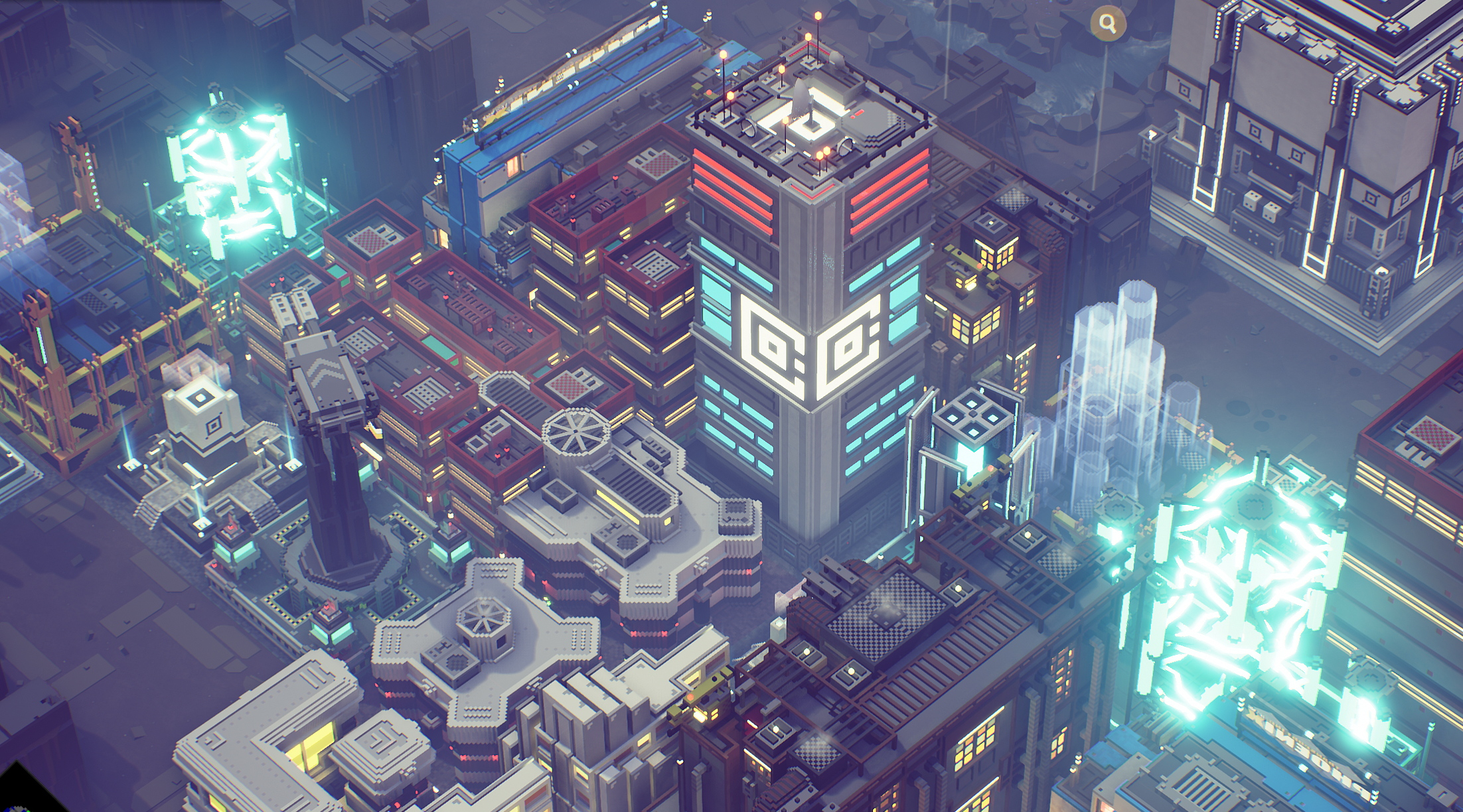
I feel like I should apologise to Titan, Saturn's gloomy moon. I moved in earlier this week, taking a break from my life as a writer to become CEO of Blamazon, the hottest new interstellar corporation. Since then, I've liberally ripped out all of its precious resources, filled the air with toxic smog and monetised my colonists by forcing them to watch undoubtedly terrible ads all day long. I wish I felt more guilty.
Industries of Titan is a city builder, but not just a city builder. It's something new, and I've not been this excited about the direction of the genre since Banished mixed things up in 2014 by throwing survival mechanics into the pot. Sure, we've seen some standouts since then, not least among them the current heavyweight champ, Cities: Skylines, and more recently the superb Anno 1800, but both are very familiar.
Arriving on Titan—after picking a faction for your corp, of which there is only one at the moment—you'll have nothing but an HQ and some big dreams. Thankfully, despite being an early access deal, Industries of Titan already has a pretty robust tutorial, complete with lots of quality voice acting, that will get you started. Right now it's mostly a sandbox, with objectives vanishing the moment the tutorial ends, so once you learn the ropes it's all about expansion. Swallow up more territory, build more offices, fatten up that bank balance.
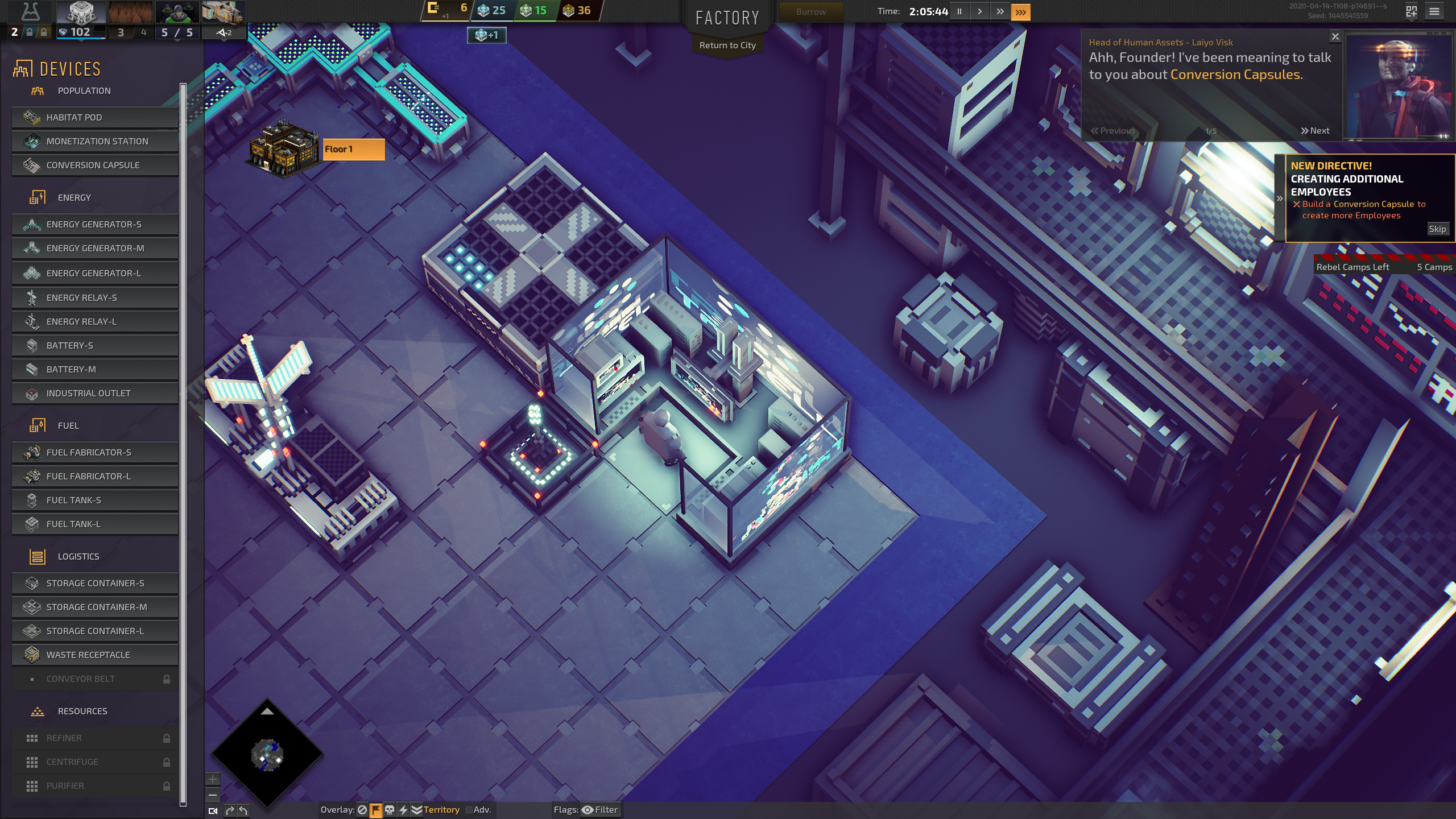
One of the most noticeable differences between IoT and its contemporaries is that you'll spend as much time inside buildings as you do poring over the map of your territory. Your upgradeable HQ, along with factories, can all be entered and customised; without your guidance, they're just empty husks that don't serve a purpose. To put them to use, you've got to fill them with storage containers, beds, monetisation stations and a very creepy device that turns your citizens into zombie-like employees that don't need sleep.
Imagine clicking on a hospital in Skylines and suddenly you're playing Two Point Hospital—it's a business management game inside a city builder, or at least the beginning of one. And these two layers are inextricably linked. Your employees harvest resources outside, and then pop into buildings to deposit them into storage containers or lay them on top of blueprints, turning them into new objects. Some of these objects require energy, which means you need power stations outside, which can be linked to buildings via relays and power outlets. But you can also construct energy and fuel generators inside the buildings, which are smaller and cheaper, to power your burgeoning corporate settlement while you get it off the ground.
Even with the tutorial, it took me some time to figure out how the energy and fuel model actually works. There are a lot of different objects and steps, while the UI unfortunately doesn't indicate how much of either resource you have, nor how much your city is using. To do that you need to hover over the generators and stations themselves. It's not the cleanest way to express important information, and it doesn't get much more important than how much energy you have.
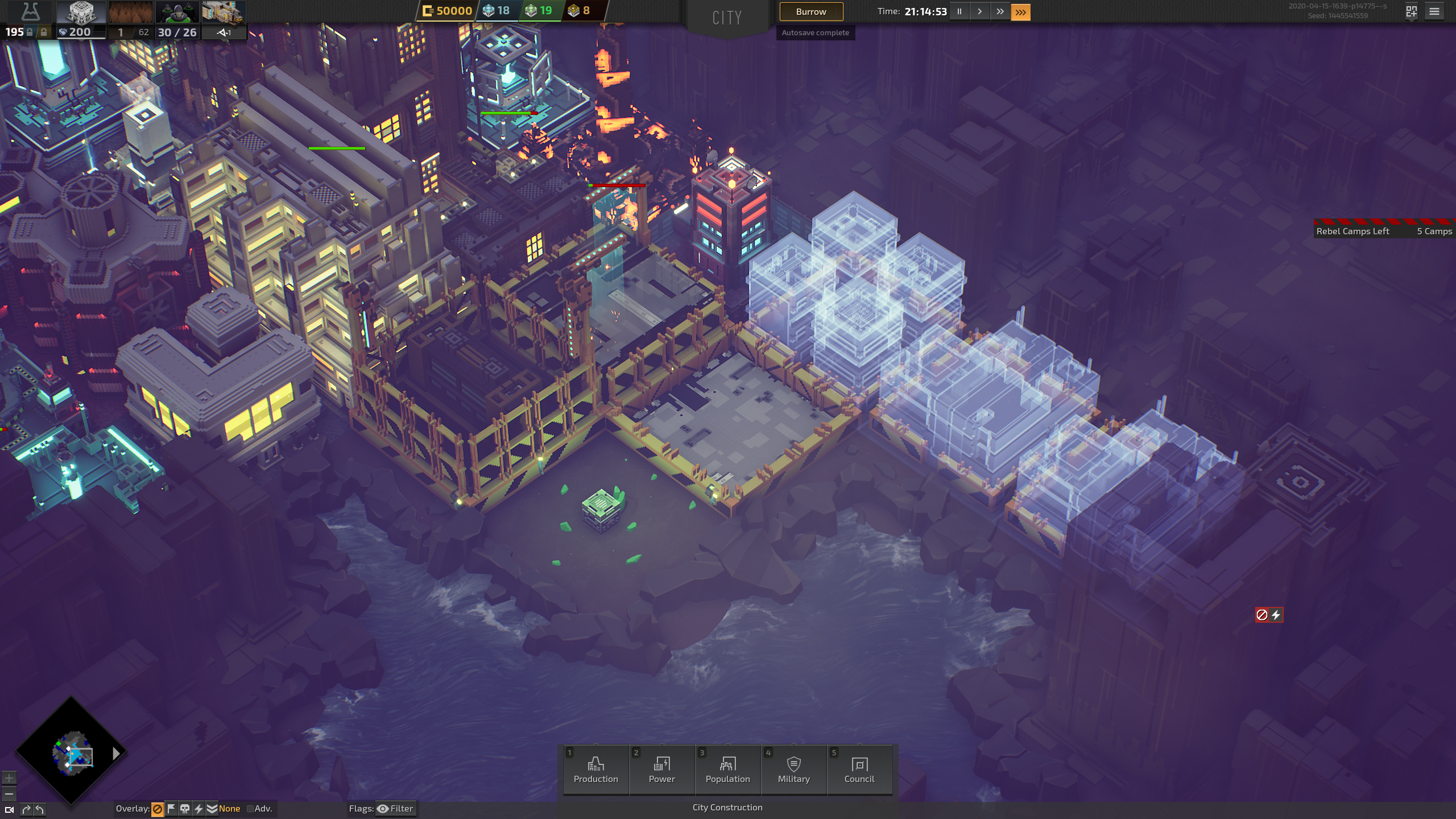
To support your expansion, you'll need to harvest minerals and isotopes, but the most important resource is people. Never let it be said that CEO Fraser Brown doesn't care about his employees or citizens. They're the ones making me rich! The two groups are equally important but serve different purposes. Employees build, harvest and do all the hard work, all without rest, while citizens just hang out, occasionally napping, but mostly staring at monetised ads.
The biggest gaming news, reviews and hardware deals
Keep up to date with the most important stories and the best deals, as picked by the PC Gamer team.
You grow your population by commandeering transport vessels by spending influence that you've earned with the planetary council. These ships will drop off resources and people, as long as you've got room for them. If space in your HQ and factories is running out, you can erect massive residential buildings to house them in greater numbers. If you need more workers, you can send them to a conversion unit or building and then transform them into a diligent, loyal employee. But that also means you'll lose a source of income. You've got to strike a balance between workers and consumers.
At this stage, you don't really need to worry about what anyone actually thinks of you. Nobody complains or has any desires, so there's no pushback yet. No tension. Nobody really cares that you're a shitty boss, so managing your population is more about finding that aforementioned balance and making sure you're keeping on top of the jobs that are mounting up by prioritising specific tasks.
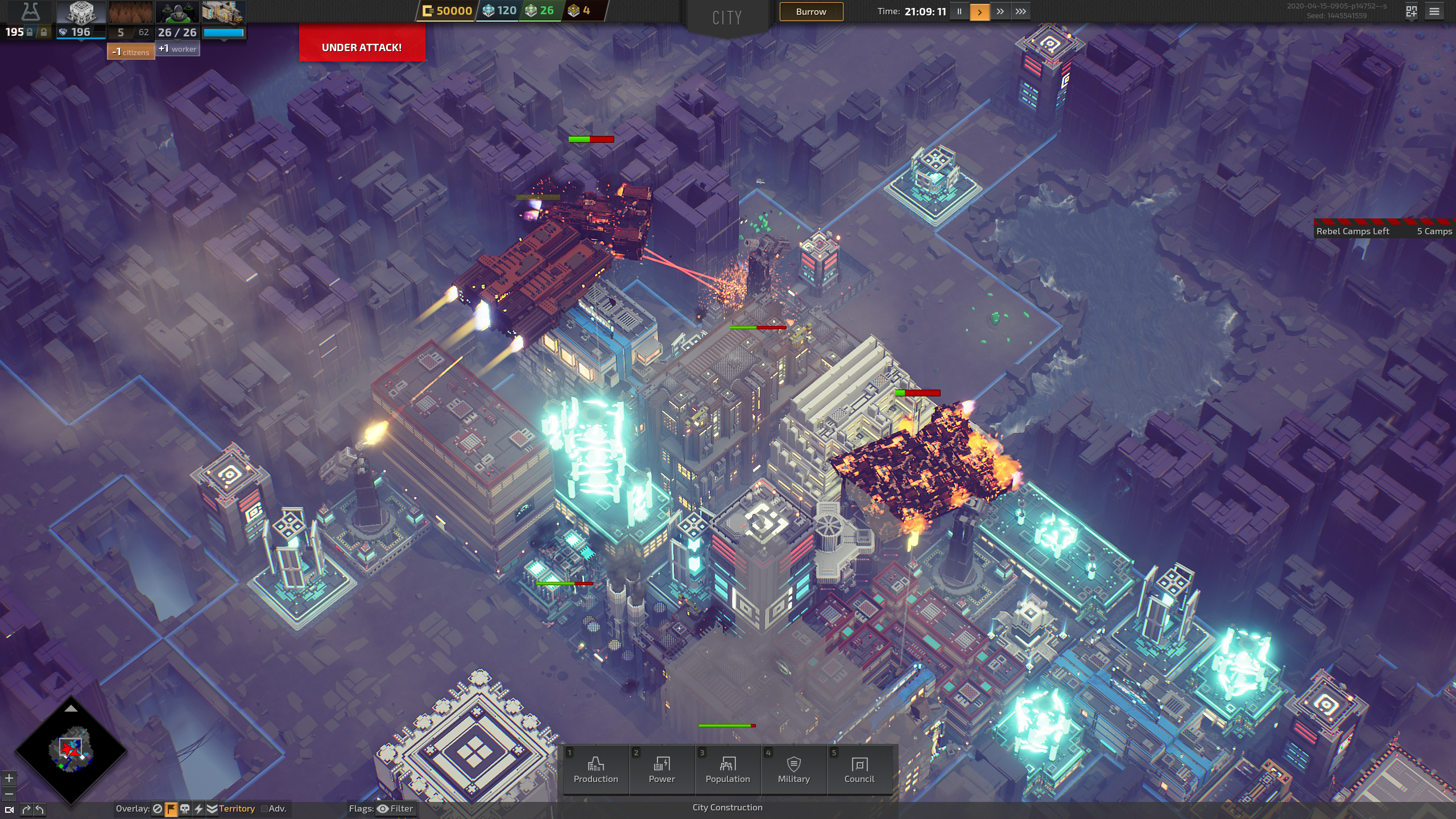
There are consequences to creating waste and pollution, however. Waste is constantly being generated by your citizens, which can then be tidied up by employees and hidden away in receptacles. If you ignore it, it will just start piling up, filling your factories and HQ, or even turning residential buildings into slums. Thank goodness, then, that you can just burn it all! Make it the atmosphere's problem instead. Unfortunately, the pollution will eventually make people sick and even start killing off your vulnerable citizens, but that's a problem for another day!
New population mechanics are part of the early access roadmap, below, which is conveniently displayed in the game's main menu. The clarity is very much appreciated, especially since IoT is currently exclusive to the Epic Games Store, where there are no forums or blogs for the devs to keep players informed directly.
This isn't to say there's zero conflict. The moment you arrive on Titan, there are already rebels waiting to strike, cowardly hiding in their bases and occasionally sending out ships to bombard your colony. These rebels are not drawn from your population, but the intensity of their assaults does increase as you get larger, necessitating more turrets and more defensive coverage. To protect your city from attack, you can go the extra mile and enact the 'burrow' command, spending a big chunk of cash to send all your buildings underground.
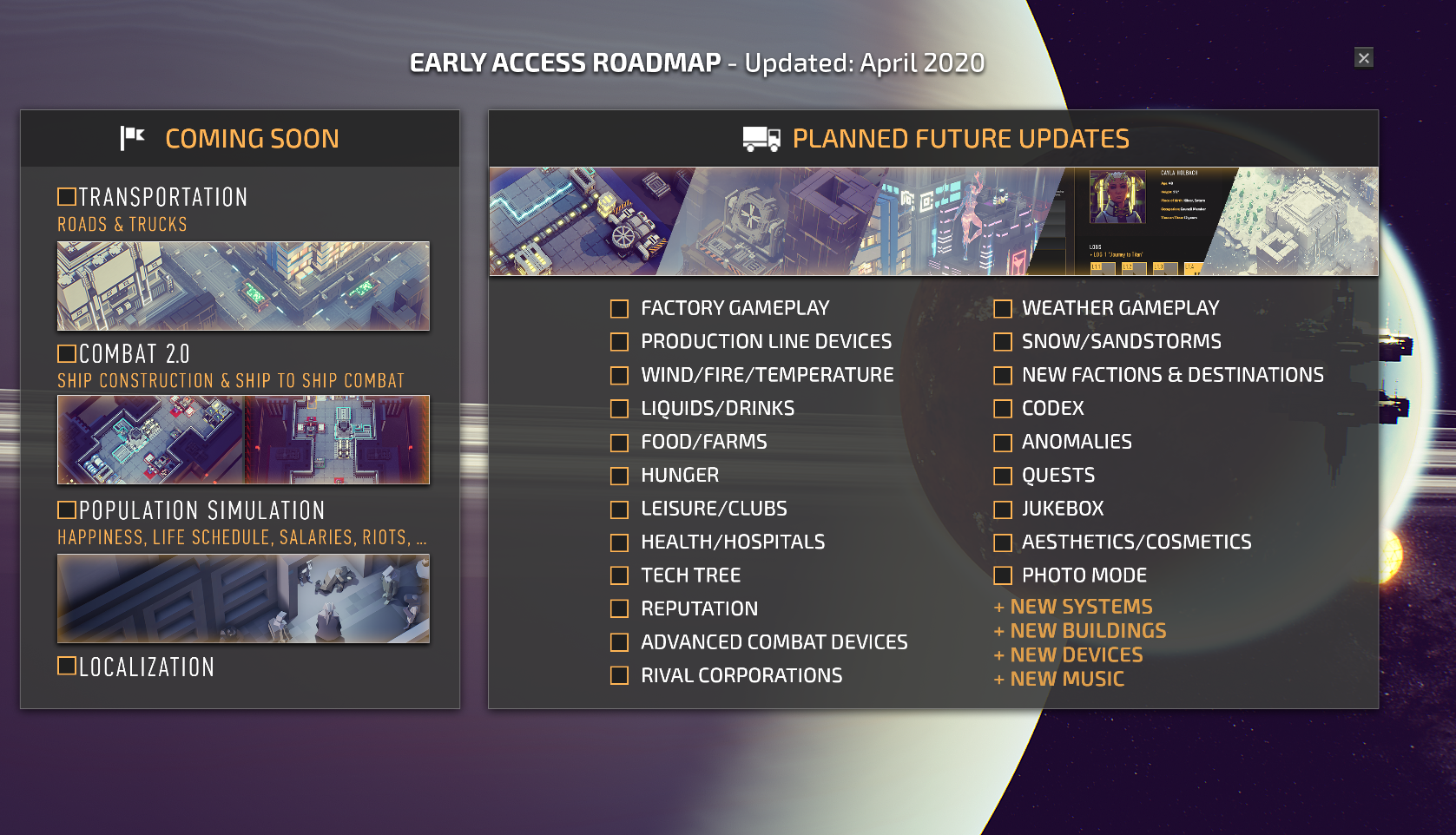
Ship combat is also coming soon, along with ship customisation, letting you go inside your ships just as you would one of your factories, adding new components and making it more deadly. James checked out the ship combat way back in 2018, though you should expect some changes since that demo.
Throwing yet another layer on top of this blend of management subgenres might seem like a bit much, and it remains to be seen how comfortably it slots into what's already here, but once you get a little city going the flow is actually quite sedate, so it might benefit from a bit more action.
While the rebels, citizens and employees don't have much personality, Titan itself is chock full of character. The blocky cities look like Blade Runner 2049's vision of LA filtered through Minecraft, accompanied by a synthy soundtrack from Danny Baranowsky that oscillates between soothing and faintly ominous. The weather is perpetually shit, and made worse when you start pumping burning waste into the air, but there's also a strange, almost preternatural beauty to it, especially when the flashes of lightning light up your huge neon skyscrapers. Weather is all cosmetic now, but eventually there will be tangible impact when these nasty storms strike.
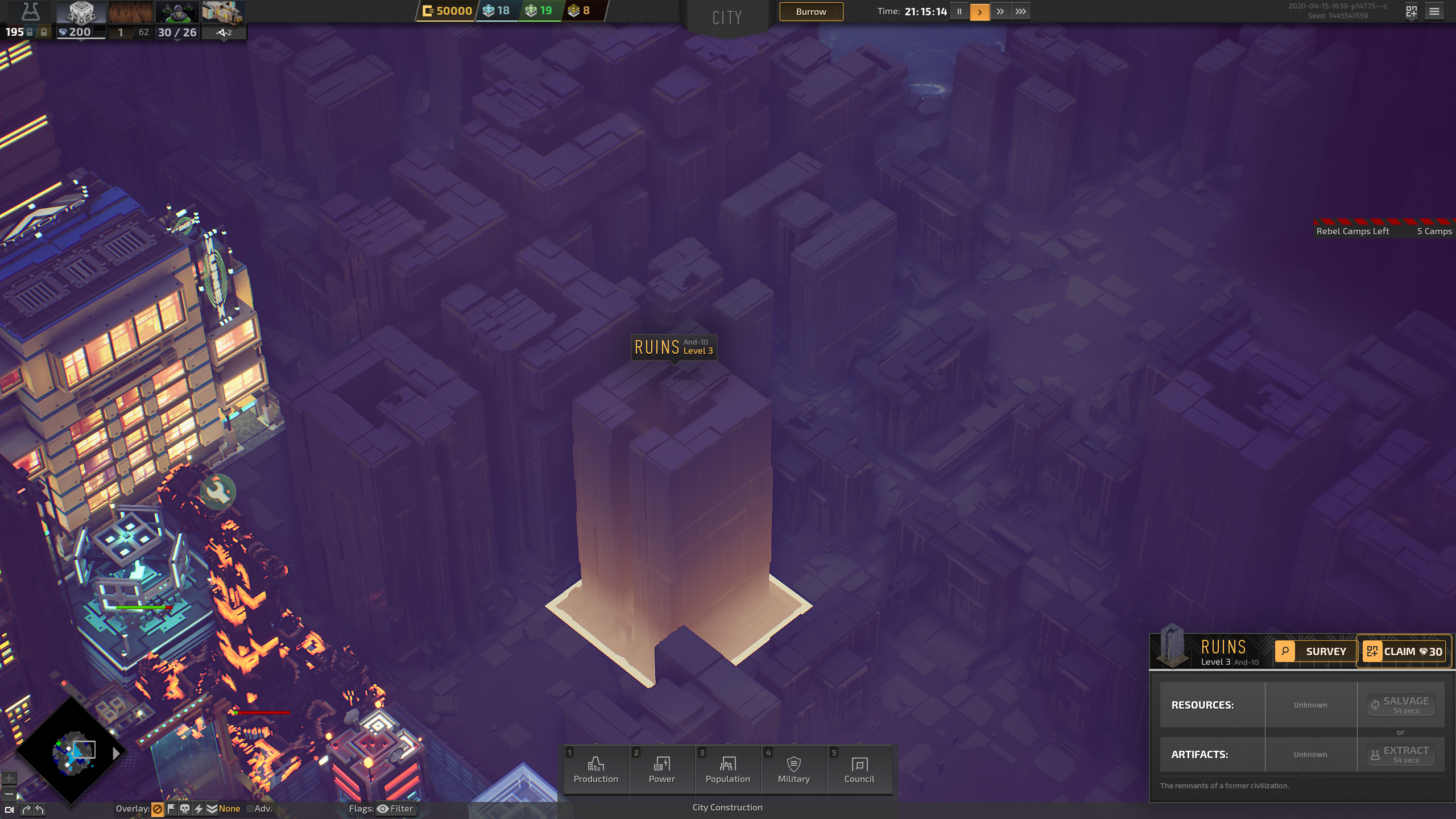
Titan's also got history. This isn't the first time humans have tried to settle it. Surrounding your settlement are the remains of a failed colonisation attempt, which left behind grim, towering monoliths. Titan doesn't have flora or rivers or forests; Titan just has dead, crumbling shells that were once homes and offices. It's a necropolis. They need to be torn down to make room for new buildings, but they can also be surveyed and excavated, netting you resources and artefacts, the latter of which are required if you want to change citizens into employees.
As well as contributing to the gloomy, almost post-apocalyptic, atmosphere, the dead city also makes expansion a lot more methodical. To expand your territory, first you need to plonk down a command centre on an open space, and then you've got to start clearing away the ruins. These derelict structures have different tiers, with more lucrative rewards found in the higher ones, guiding the direction of your borders.
Pretty quickly, you'll have more space than you need, but you'll also want to grow so you can reach new resource nodes and start building mines. You don't need to fill up every space, however; at least not outside. Interiors are more cramped, and trying to cram everything you need into a tiny factory floor requires a lot of rotating and fiddling. There's the hint of a puzzle in the way you fill up your buildings. Thankfully, you can upgrade them, which adds whole new floors, and even connect two buildings together.
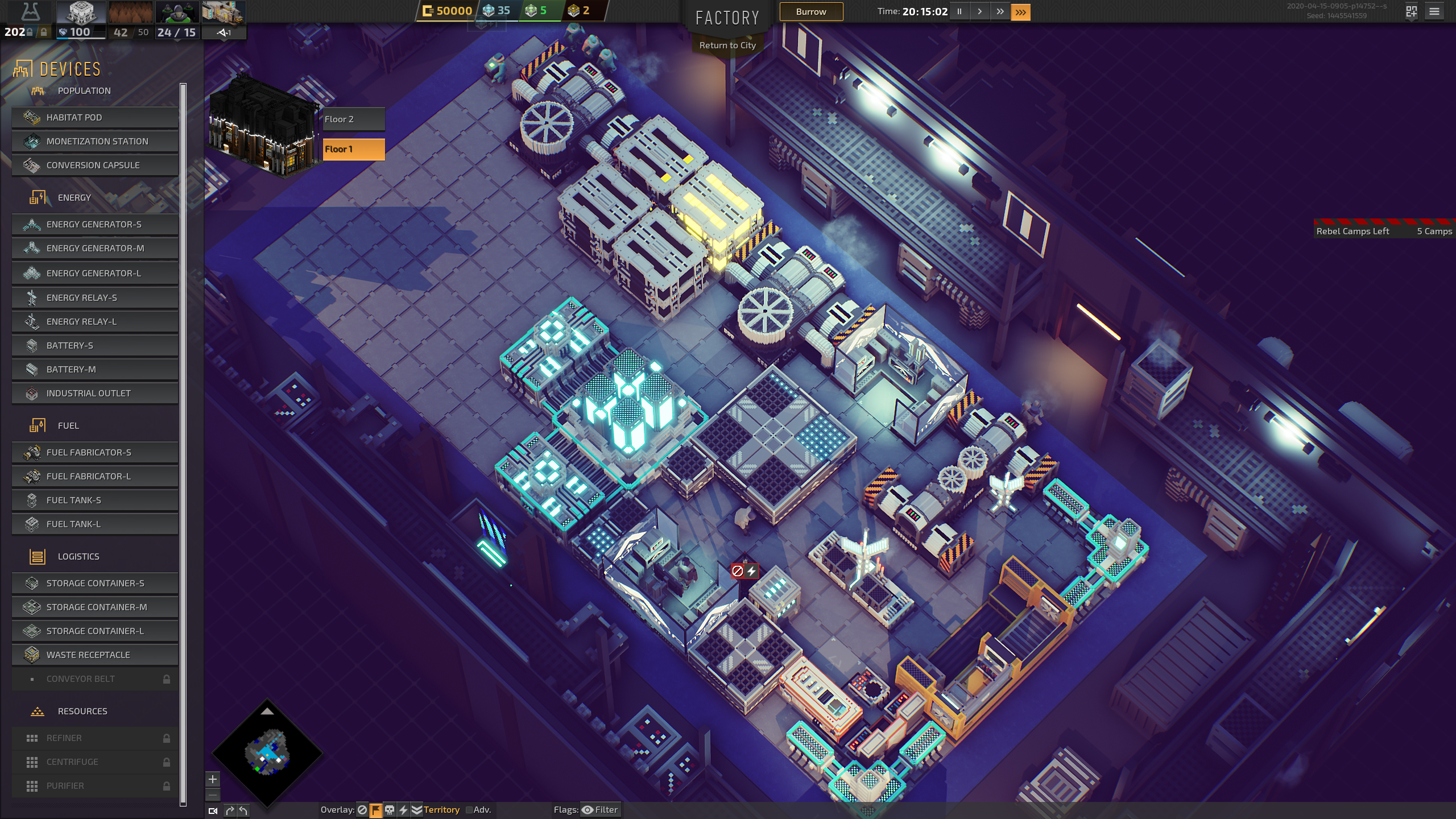
It's more polished than your typical early access game, likely because Brace Yourself Games hasn't overextended itself. You can see most of what it offers in a couple of hours, though even with the new features petering out quickly, I've still been compelled to keep playing and expanding. It's clear that the studio is trying to nail the basics first, before throwing in more from its long list of planned systems.
Stability is still an issue, though. As my city grew, crashes became more frequent. In a couple of instances, I had to go back to an old save because loading up the latest one kicked me back to my desktop immediately. Aside from the crashes and one very specific animation glitch that made citizens lie down on the floor when being converted into employees, I've not encountered other problems.
It's a very solid foundation, but it's still just a foundation. There's no competition from other corps because, at the moment, there are no other corps; there's no tech tree, so you get what you start with and nothing more; combat amounts to building turrets, which isn't all that engaging; and despite being a corporation, you don't actually make anything or offer any services. Its ambition is already evident, but there's no denying that it's still very bare bones. It's one to watch, and keep a very close eye on, but perhaps not one to grab right away.

Fraser is the UK online editor and has actually met The Internet in person. With over a decade of experience, he's been around the block a few times, serving as a freelancer, news editor and prolific reviewer. Strategy games have been a 30-year-long obsession, from tiny RTSs to sprawling political sims, and he never turns down the chance to rave about Total War or Crusader Kings. He's also been known to set up shop in the latest MMO and likes to wind down with an endlessly deep, systemic RPG. These days, when he's not editing, he can usually be found writing features that are 1,000 words too long or talking about his dog.

